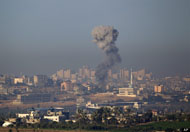
It has been quite a week with quite a few surprises. No doubt, Gaza is the center of the news in addition to the hearts and minds of all Palestinians as the death toll from Israel’s Pillar of Defense operation raises to 39 as of today, November 17. While Israel officially began its operation on November 14 with the assassination of Izzedin Qassam Brigades commander Ahmad Jaabari, its offensive against Gaza had begun to build up days before.
On November 12, at least seven Palestinians had been killed and dozens of others injured in intermittent shelling amid talks of ceasefire agreements brokered by Egypt. While the two sides had unofficially abided by a state of calm, this precarious agreement was shattered when Israel took out Jaabari, while he was travelling in a car in Gaza City. Israel said its attack on Jaabari was because he was "directly responsible for executing terror attacks". Jaabari was a key figure in the capture and release of Israeli soldier Gilad Shalit.
The assassination sparked fury among Gazans and Hamas leaders, with its armed wing, the Qassam Briagades callng for revenge. In a statement released that same day, the Brigades said Jaabari’s assassination had "opened the gates of hell."
It did. Now in its fourth day, Operation Pillar of Defense has killed and injured hundreds of Palestinians, both resistance fighters and civilians. Five people were killed this morning in Israeli attacks while 30 injured people were pulled from beneath the rubble of a home targeted by Israeli airstrikes. The home, belonging to Hamas leader Suleiman Salah in Jabaliya, was three stories’ high.
Of the 39 people killed since Wednesday, November 14, eight are children, with almost 300 wounded people including over 100 children.
This time around, unlike the crude homemade rockets fired during Israel’s last invasion in 2008-2009, Palestinian resistance movements have shown how much they have advanced. Long range missiles – dubbed Fajr-3 are now being shot into Tel Aviv and as far as Jerusalem, throwing Israel for a loop. So far three Israelis have been killed in the Tel Aviv-area town of Kiryat Malachi when a Palestinian missile fell on a home there. Several others were injured. Warning sirens have gone off throughout Israel over the past few days with sirens sounding in Jerusalem on November 16 after the Qassam Brigades announced they had fired long-range missiles at the Knesset. Israeli police also said a rocket fell near the Gush Etzion settlement bloc in the West Bank while others near Bethlehem said a rocket fell near the illegal settlement of Gilo south of Jerusalem. Dozens of the rockets, however, have been intercepted by Israel’s Iron Dome system.
On November 17, a massive Israeli air assault struck and severely damaged the Hamas government headquarters and a police station. Israeli warplanes also bombed the home of a Qassam Brigades operative in Rafah and a mosque in Bureij refugee camp, injuring five civilians. On November 16, an attack on Rafah killed one Palestinian and seriously injured two others. The strike hit three men riding a motorcycle. Earlier in the day, Israel bombed the al-Maghazi refugee camp in the central Gaza Strip killing Hamas military leader Ahmad Abu Jalal, 43, his brother Majd and two others.
Israel, meanwhile says it authorized the mobilization of up to 75,000 reserve troops on November 16 for a possible ground invasion into Gaza, more than doubling the number of potential call-ups approved after the offensive began.
The United States under President Barak Obama is continuing to blame the Palestinians for the escalation, pressuring Egypt to score a ceasefire between the two sides.
On November 15, the United States asked countries “that have contact with Hamas” to urge the group to stop its recent rocket attacks from Gaza, a White House adviser said.
"We've ... urged those that have a degree of influence with Hamas such as Turkey, and Egypt and some of our European partners to use that influence to urge Hamas to de-escalate," said Ben Rhodes, deputy national security adviser.
Then on November 16, Israeli Prime Minister Benjamin Netanyahu called President Obama to thank the American leader "for the United States' investment in the Iron Dome rocket and mortar defense system,” according to a statement issued by the White House. During the call, Obama "reiterated U.S. support for Israel's right to defend itself," the statement said. In the past two days, both houses of Congress have unanimously passed resolutions supporting Israel's right to defend itself.
President Obama also phoned Egyptian President Mohammed Morsi, in which he "commended Egypt’s efforts to de-escalate the situation and expressed his hope that these efforts would be successful." Egypt has offered to mediate a truce between Israel and Hamas.







